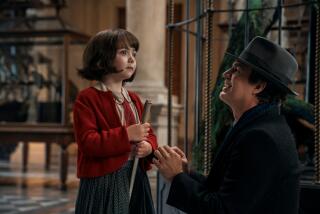TV & VIDEO - March 6, 1989
- Share via
Boston’s public television station WGBH, which pioneered closed captions for the hearing impaired 15 years ago, has developed a service that makes TV vivid for the blind and visually impaired by having a narrator describe a program’s setting and action during pauses in dialogue. Descriptive Video Services broadcasts the added narration over a special channel that can be tapped by people with a stereo television or a video cassette recorder. The station tested the service last year and is seeking funding to make it available in January, 1990, to the nation’s estimated 12 million visually impaired people. During the testing, a viewer tuned to the play “Lemon Sky” could hear as the credits rolled: “A mountain silhouette in the distance, palm trees closer. A boy’s bike between a high, brown wooden fence. In the foreground a white, mid-’50s convertible gleaming in the sun, its top down.” Then later, after a character spoke his lines: “He strolls away from the car toward the house, pausing in the doorway.” WGBH needs $300,000 to launch the service nationally five hours a week and $1 million annually to keep it going.
More to Read
The complete guide to home viewing
Get Screen Gab for everything about the TV shows and streaming movies everyone’s talking about.
You may occasionally receive promotional content from the Los Angeles Times.






